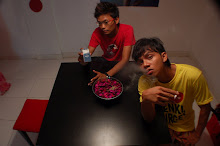50% of Malaysians could be overweight, says minister
By AUDREY EDWARDS
PETALING JAYA: The perennial dilemma of overweight and obese Malaysian adults does not seem to be improving with the Health Ministry expressing fears that more than 50% of Malaysian adults could now be saddled with the problem.
Its minister Datuk Liow Tiong Lai said while the National Health and Morbidity Survey in 2006 revealed the combined prevalence of overweight and obese adults was 43.1% - almost double the figure a decade ago, the current numbers could have already increased over the past two years.
The estimated number of Malaysian adults above the age of 20 is about 13 million.
Liow pinned the disturbing situation down to the lack of proper health knowledge where Malaysians need to be better informed and motivated to stay healthy in terms of diet, physical activity, stress management and disease prevention.
He said Malaysians had also grown accustomed to an affluent lifestyle where they were more comfortable sitting at home and watching television or being in front of the computer instead of enjoying the great outdoors.
"For example, how many people know that losing even a modest 5% to 10% of their weight can result in reduced sickness and death?" he said in his speech Saturday when launching Nutrition Month Malaysia 2008.
Liow, who took a jibe at his own weight problem where he weighed 75kg instead of the desired 70kg, added that Malaysians took "eating right" lightly where they did not know what to eat, when to do so and how much they should consume.
"There is plenty to eat but, unfortunately, many of us are not making wise decisions with regards to what and how much we should eat. Instead of using common sense, we act on impulse," he added.
"With our busy lifestyles, we would rather eat out than at home, opt for fast food rather than cook at home. And, too often, we spare little thought about the health and nutritional value of what we put into our tummies, if we remember to eat at all."
Malaysian Association for the Study of Obesity president Prof Dr Mohd Ismail Noor later revealed that about 90% of overweight and obese adults in the country were "very likely" to develop diabetes.
"What is worrying is that younger people who have diabetes and are also overweight. You do not have to wait until you are 40 to have this disease. They are now as young as 25," he said.
He warned the problem had to be nipped in the bud because the combined access to food 24 hours a day and lack of exercise was a "recipe for disaster".
"Look at the West. They have promotional health campaigns and yet it is not working there," he said.
He also said if one parent is overweight or obese, the chances of the child being in a similar situation was 40%.
The chances increased to 80% if both parents are either overweight or obese, he said.
Genetic predisposition, he said contributed to between 10% and 15% of those who faced the weighty problem in the country.
Hence, this article has prompt me to relate it with my critical thinking studies,The Main Claim: "The perennial dilemma of overweight and obese Malaysian adults does not seem to be improving with the Health Ministry expressing fears that more than 50% of Malaysian adults could now be saddled with the problem."
Supporting Argument 1: Liow pinned the disturbing situation down to the lack of proper health knowledge where Malaysians need to be better informed and motivated to stay healthy in terms of diet, physical activity, stress management and disease prevention. He said Malaysians had also grown accustomed to an affluent lifestyle where they were more comfortable sitting at home and watching television or being in front of the computer instead of enjoying the great outdoors.
Premise 2: Datuk Liow, who took a jibe at his own weight problem where he weighed 75kg instead of the desired 70kg, added that Malaysians took "eating right" lightly where they did not know what to eat, when to do so and how much they should consume.
Supporting Argument 2: There is plenty to eat but, unfortunately, many of us are not making wise decisions with regards to what and how much we should eat. Instead of using common sense, we act on impulse," he added. "With our busy lifestyles, we would rather eat out than at home, opt for fast food rather than cook at home. And, too often, we spare little thought about the health and nutritional value of what we put into our tummies, if we remember to eat at all.

No comments:
Post a Comment